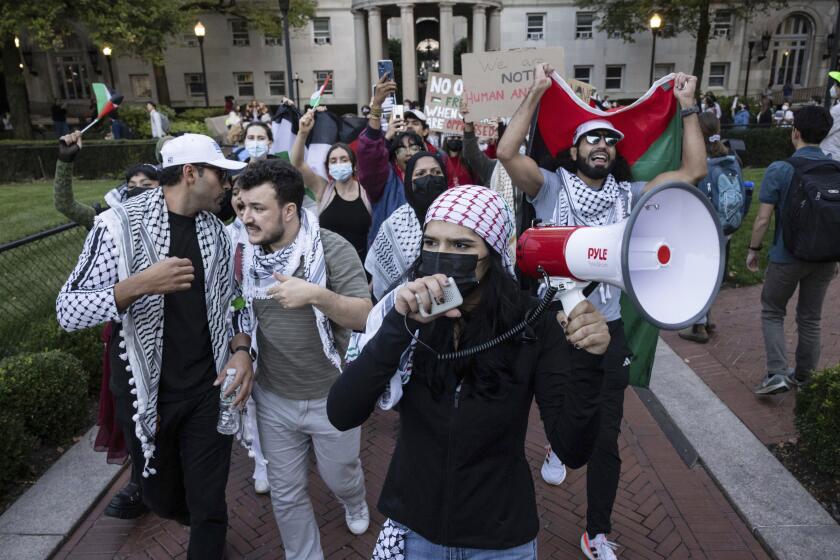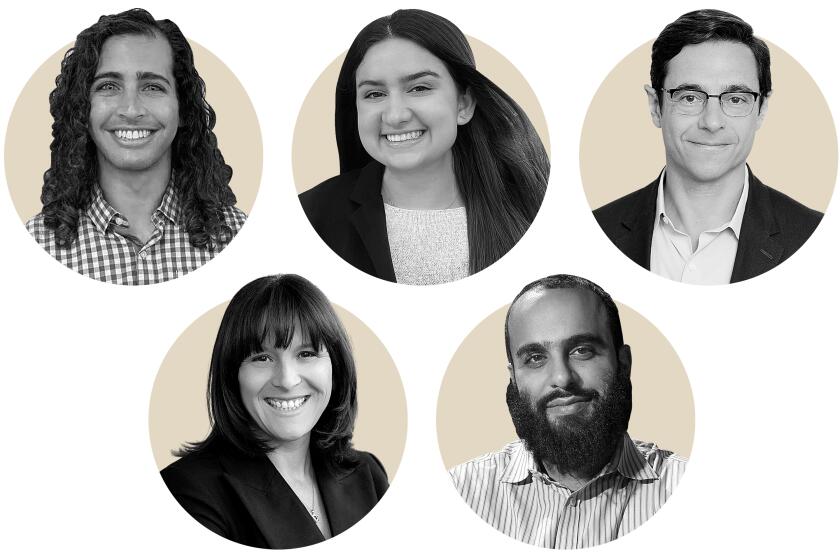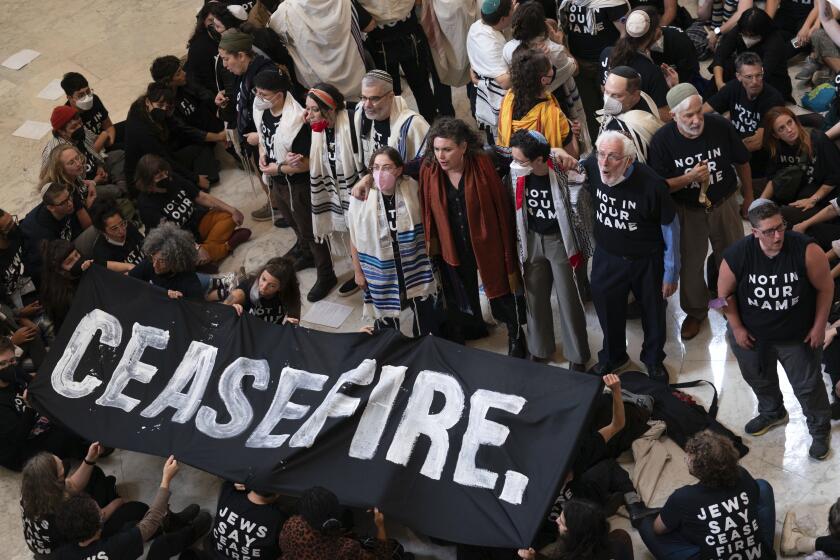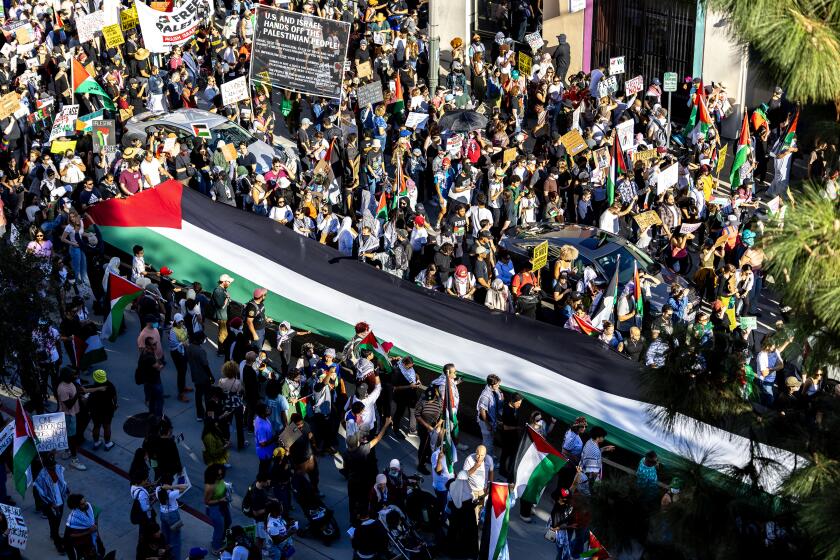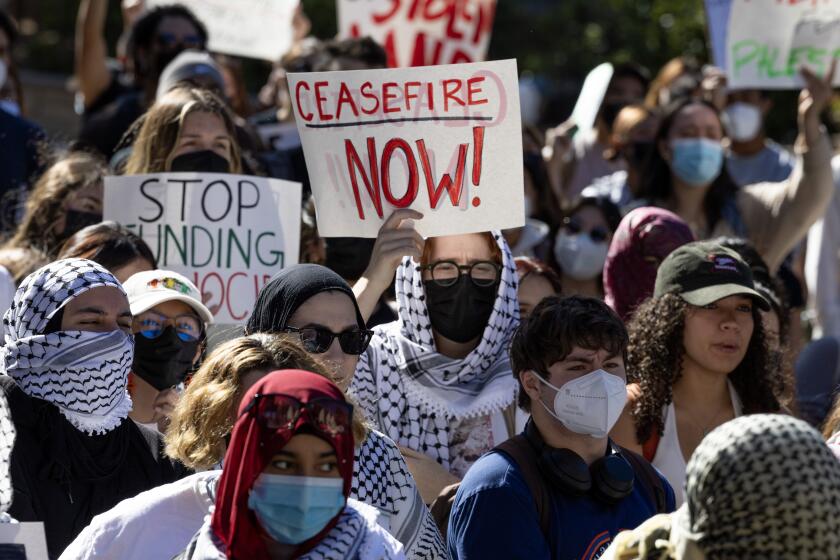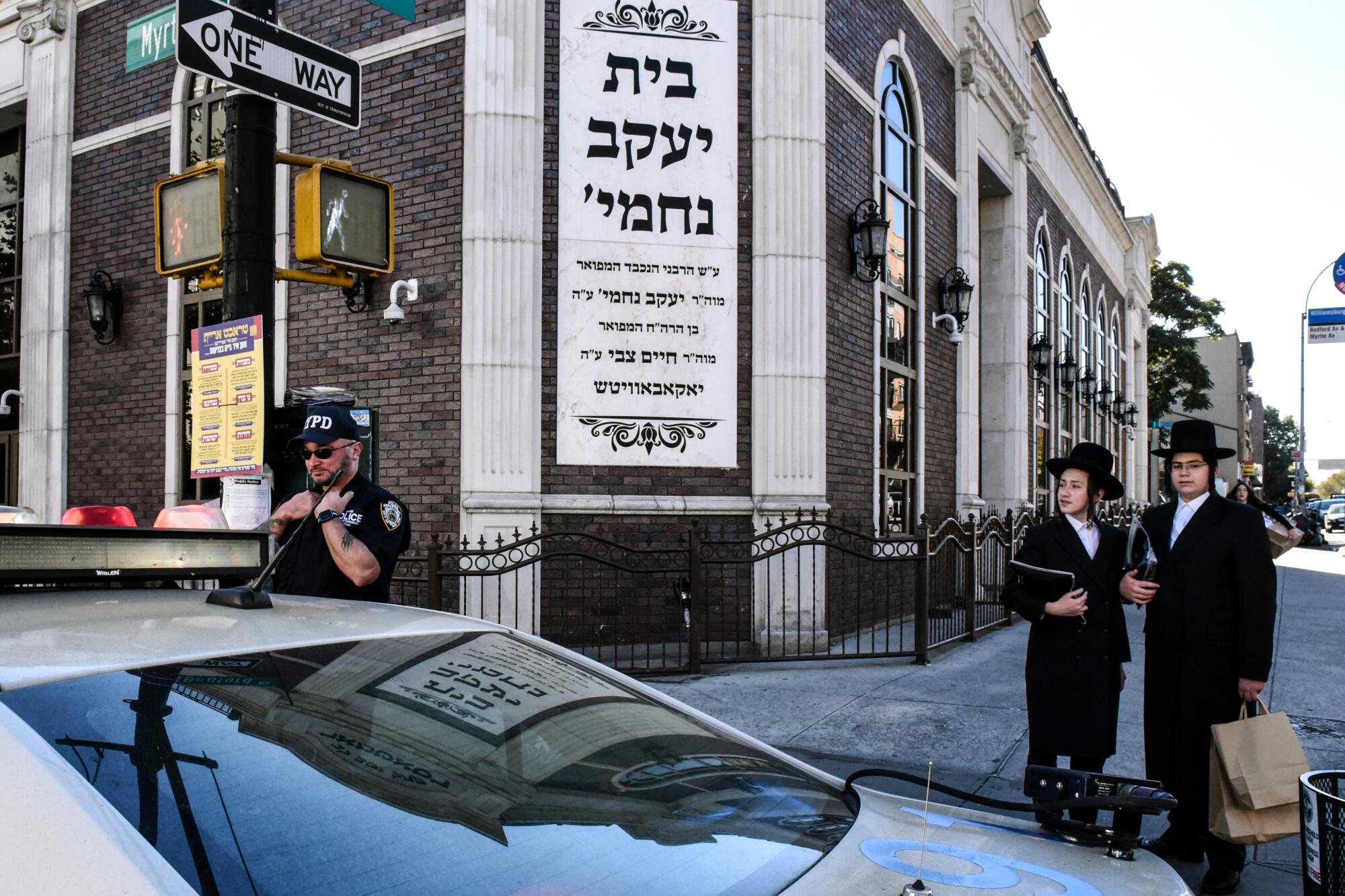
- Share via
Like a plague that long lay dormant, antisemitism has sprung back to virulence in the U.S., deeply unsettling American Jews, many of whom had viewed it as a relic of past generations, destined to fade away.
The upsurge began before the war in Gaza and has now accelerated, bringing intense debate over how to define an ancient hatred in modern times — in particular, where robust opposition to Israel or Zionism crosses the line into antisemitism.
A large share of the recent debate has focused on college and university campuses, generating congressional hearings and costing at least one prominent university president her job.
Incidents of hatred aimed at Jews, however, go far beyond campuses. Recent antisemitic acts nationwide include graffiti and vandalism at Jewish stores, restaurants and institutions, shots fired in the vicinity of synagogues and assaults on people wearing yarmulkes, Star of David pendants or other Jewish apparel.
The cumulative impact has had a profound effect on the psychology of the American Jewish community.
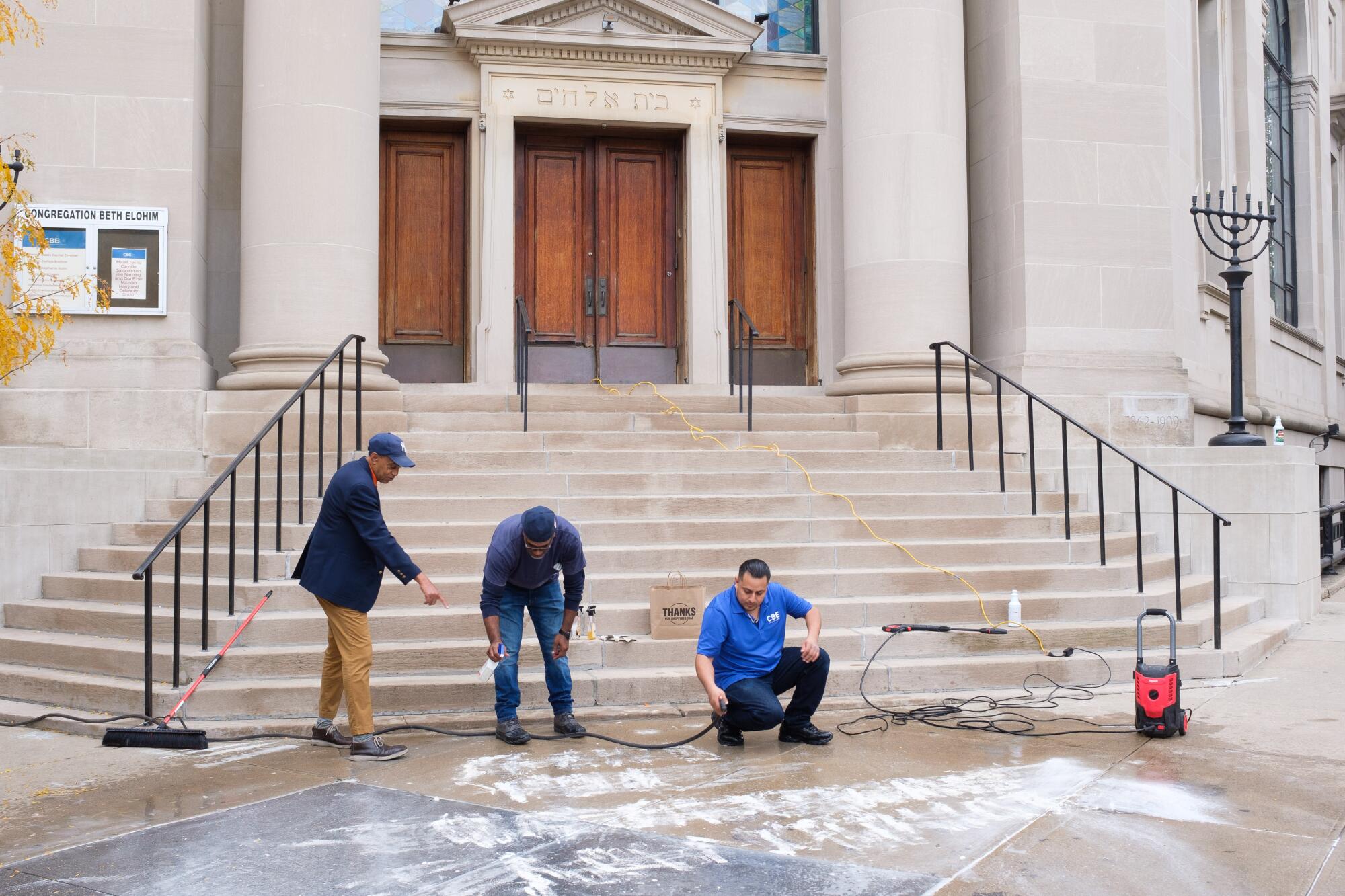
In a survey released last month by the Jewish Federations of North America, nearly 9 in 10 American Jews and more than 6 in 10 Americans overall said they believed there was more antisemitism in the U.S. now than five years ago. Asked to consider “just the last few weeks,” one-third of the general population, but more than 7 in 10 Jews, said they believed antisemitism was on the increase not just nationally, but in their local communities.
The Palestinian cause — and hostility toward Israel — has shifted from the sidelines of student activism to a robust political movement at U.S. colleges.
Four in 10 American Jews said they worried “very much” or “all the time” about their personal safety because of their race, religion or other characteristics, a level more than twice as high as the general population, according to the survey, conducted by the New York-based Benenson Strategy Group. Strikingly, the share was higher among younger Jews than older ones.
“I think it’s important to recognize in this moment how vulnerable and fearful many Jews feel,” UCLA political science professor Dov Waxman said in a recent roundtable discussion about antisemitism convened by The Times.
The Times gathered a panel of Jewish thinkers to talk about recent incidents and help define what antisemitism is and what antisemitism isn’t.
“There’s really a deep, widespread sense of alarm,” he added. “It’s intensified over the last two months, but it’s been really growing for a number of years now.”
Shira Dicker, 63, a self-described politically and theologically liberal Jew, said she grew up in New York thinking that “people who sounded alarms on antisemitism were sometimes exaggerating.”
“Now, I realize that more people hate Jews than I thought,” she said. “To be Jewish in America right now is to feel a sense of emergency.”
Rabbi Jason Rubenstein, Jewish chaplain at Yale University, hears students express similar feelings.
Many young Jews grew up with a belief that antisemitism was a “vestigial memory” in the U.S., he said. Now, there’s a feeling of having “woken up in a different world,” one that feels “tectonically destabilized.”
: :
When Jeffrey Kopstein left the University of Toronto in 2015 to join the political science faculty at UC Irvine, friends warned him that the campus had a reputation for significant amounts of antisemitism as well as strong opposition to Zionism — the belief that Jews, like other groups, have the right to a homeland of their own and that it should be in the territory where Judaism began in ancient times. Curious if that was true, he set out to study campus opinion.
Using a battery of questions to probe for beliefs on subjects such as hidden Jewish power, whether Jews are greedier than other people, whether Jews are responsible for the crucifixion of Jesus and other indicators of antisemitism, Kopstein and another researcher, Rachel Shenhav-Goldberg, surveyed a random set of undergraduates. They also asked a separate set of questions about attitudes toward Israel and the Palestinians.
Students, on average, ranked fairly high on anti-Israel sentiment.
Israeli military raids and settler attacks in the occupied West Bank are costing the Palestinian economy $25 million a day, just ask the sweets makers.
The results on antisemitism were less clear-cut: About 25% showed fairly high levels of antisemitic beliefs, though only about 2% were antisemitic across the board.
And while there was some overlap between antisemitism and anti-Zionism, the two were also clearly separate. Some students with strong anti-Israel views espoused significant antisemitic beliefs, others didn’t. There was even a small group of students, mostly religiously conservative Christians, who strongly supported Israel while espousing a high number of antisemitic tropes.
Those results are similar to what recent surveys have found in the general U.S. population.
One conducted last year by the National Opinion Research Center at the University of Chicago for the Anti-Defamation League reported that about 1 in 5 adult Americans embraced a significant level of antisemitic belief — double the level of the previous year and the highest in more than a generation.
The survey found that only 3% of the population agreed with all the anti-Jewish tropes it asked about. As ADL researchers noted, however, 3% of the U.S. population corresponds to roughly 8 million people — significantly more than the roughly 5.8 million Americans who are Jewish. The FBI consistently finds two groups to be the targets of the most hate crimes in the U.S.: Black people and Jews.
The study also found that antisemitic beliefs remain more common on the political right while opposition to Zionism is more common on the left, and that acceptance of antisemitic statements is more common among people who don’t know any Jews and goes hand-in-hand with belief in other conspiratorial theories.
‘Our human ask is that people give a damn when we die,’ said one rabbi. Amid the Israel-Hamas war, many U.S. Jews feel betrayed by people they thought were allies.
Notably, Kopstein’s study of students found no difference between those surveyed in their first semester and those who had been on campus for four years — evidence that, despite widespread claims by conservative critics of higher education, college doesn’t incubate antisemitic views.
“The U.S. doesn’t have a university problem,” Kopstein says. “It has an antisemitism problem.”
This year, Kopstein, who directs UC Irvine’s Jewish studies program, expanded his research to other UC campuses, getting samples of students from administrations at individual schools — except for Berkeley, which refused to participate.
His most recent survey happened to be in the field during late September and early October, giving him a before-and-after view of how students responded to the Oct. 7 Hamas attack on Israel and the early days of Israel’s response.
As he expected, anti-Israel sentiment rose a lot. What came as a surprise was that antisemitism increased, too.
“It’s not gigantic, but it’s there,” he said. One might have expected the deaths of 1,200 Israeli civilians to trigger a degree of sympathy for Jews, he said. Instead, the opposite happened.
“I call that an empathy fail.”
: :
Measuring antisemitic beliefs can be challenging, but defining what constitutes an antisemitic act has proved even more difficult, especially when the question turns to the line between anti-Zionist speech and expressions of antisemitism.
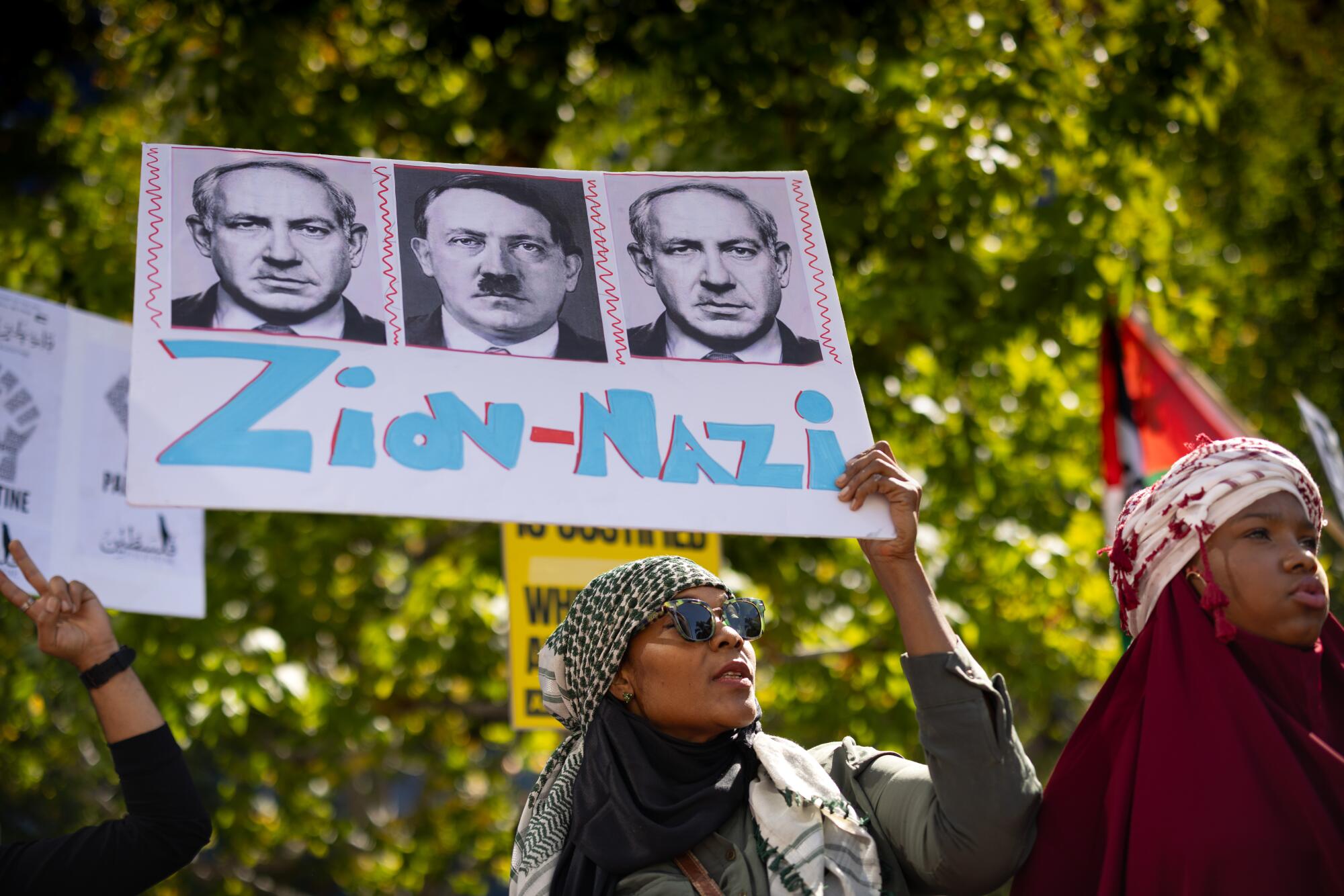
In 2016, the International Holocaust Remembrance Alliance, a quasi-governmental international body, agreed on a working definition of antisemitism that 43 countries have incorporated into their own policies. The Trump administration adopted the IHRA definition in 2019, as have about half of U.S. states.
“Denying the Jewish people their right to self-determination, such as by claiming that the existence of a State of Israel is a racist endeavor,” is an example of antisemitism, the IHRA said. So, it added, is “applying double standards by requiring of Israel behavior not expected or demanded of any other democratic nation.”
Critics say that casts too wide a net, stigmatizing criticism of Israel that they view as legitimate.
Where are Israel-Hamas war protests growing and how are messages shifting? Here’s what the data on over 2,000 pro-Palestinian and pro-Israeli demonstrations say.
Rival definitions, including one proposed in 2021 by a group of some 200 scholars, aim to provide more room for robust, even harsh, debate.
“Hostility to Israel could be an expression of an antisemitic animus, or it could be a reaction to a human rights violation, or it could be the emotion that a Palestinian person feels on account of their experience at the hands of the State,” the scholars said in their statement, known as the Jerusalem Declaration.
The statement declared that it is antisemitic to hold “Jews collectively responsible for Israel’s conduct” or to require “people, because they are Jewish, publicly to condemn Israel or Zionism (for example, at a political meeting).”
But, it added, “criticizing or opposing Zionism as a form of nationalism, or arguing for a variety of constitutional arrangements for Jews and Palestinians in the area between the Jordan River and the Mediterranean,” is not antisemitic in all cases. “It is not antisemitic to support arrangements that accord full equality to all inhabitants ‘between the river and the sea,’ whether in two states, a binational state, unitary democratic state, federal state, or in whatever form,” it said.
Andrew Klein, 29, a Jewish activist who has joined anti-Israel protests supporting a cease-fire in Gaza, takes that view.
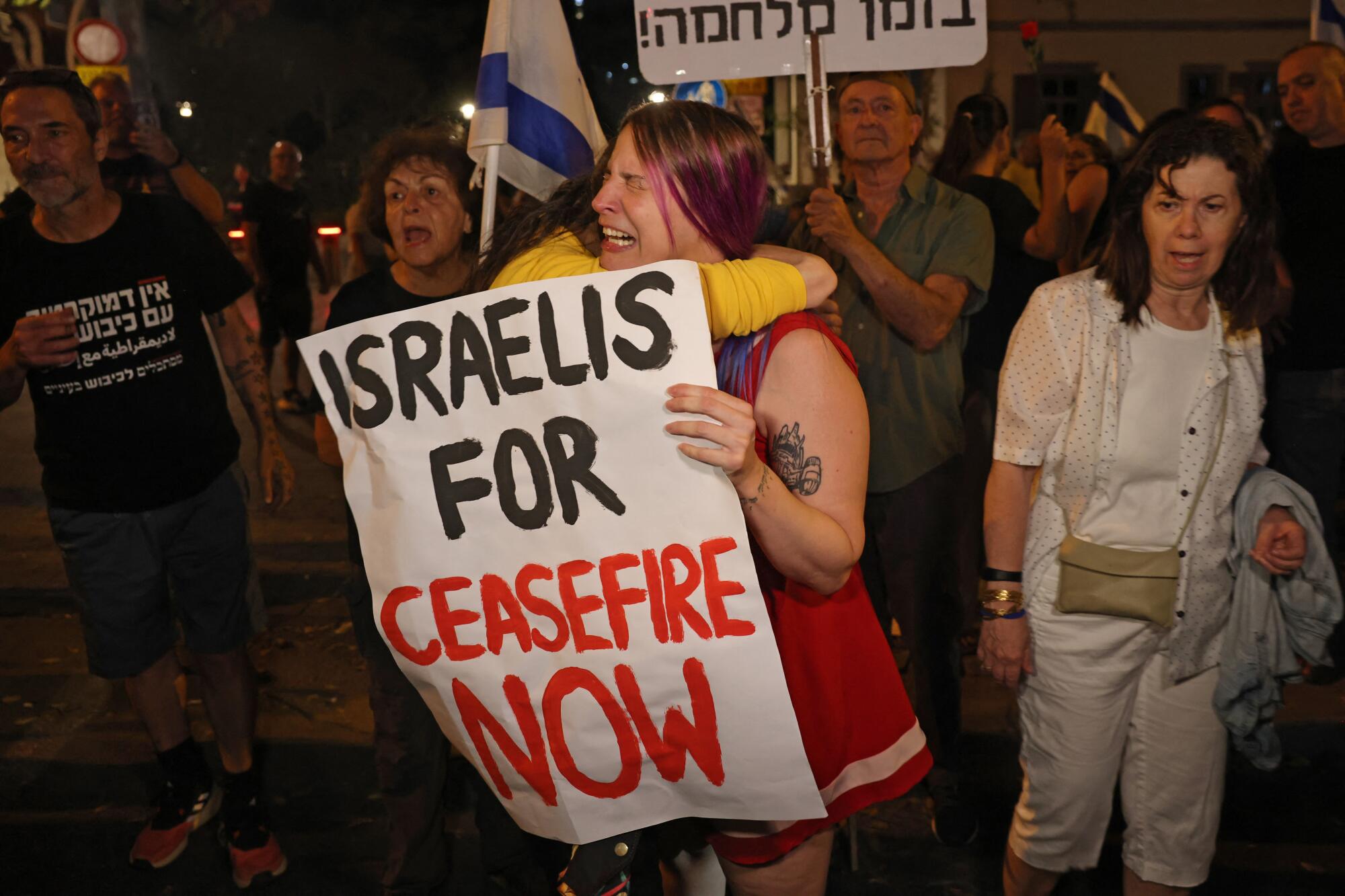
“Saying Israel is racist is not anti-Jewish, it is literally just describing the practices by Israel,” he said. “Antisemitism is real. But there are plenty of things happening right now that are called antisemitism that really aren’t.”
In the public arena, that line is often clouded by politics.
In one recent case, people taking part in a pro-Palestinian march through downtown Philadelphia stopped outside of Goldie, a restaurant owned by a well-known Israeli chef, Michael Solomonov, and chanted slogans accusing him of participating in “genocide” against Palestinians in Gaza, where local health authorities say more than 18,600 people have been killed in more than two months of warfare.
Organizers of the march later said they had targeted the restaurant because of Solomonov’s public statements in support of Israel and his fundraising on behalf of United Hatzalah, an ambulance service that provides emergency medical assistance in Israel, including to members of the army.
The protest drew condemnation from the White House, Pennsylvania’s governor, political leaders from both parties and the ADL.
“Vandalism of a Jewish business isn’t political protest,” said Jonathan Greenblatt, the chief executive of the ADL. “Boycotts have historically targeted the Jewish community at times of crisis, and it’s alarming that it’s happening again now.”
Several Jewish Angelenos who participated in The Times’ roundtable said they were unconvinced, noting that the nonviolent protest didn’t target Jews in general, but a specific individual who had taken a public pro-Israel stance, and that shouting slogans doesn’t constitute vandalism.
A more ambiguous event took place recently in Westbrook, Maine, a suburb of Portland. After a resident complained about a Star of David in the town’s holiday display, saying it was an offensive endorsement of the war in Gaza because it also appears on the Israeli flag, city officials replaced the star with a dreidel.
The director of the local Jewish federation said she accepted the decision.
“It’s possible that someone would ask for the removal because they are antisemitic, but it’s also possible that that’s not the reason,” said Molly Curren Rowles, who leads the Jewish Community Alliance of Southern Maine. “I would have rather approached this as a moment of interfaith education. How can we use this moment as an opportunity to learn about other cultures and not find fear when we don’t need to?”
: :
Some of the hardest questions involve college campuses, where clashes are almost inevitable as students and faculty routinely live and work among people with drastically different opinions. University officials around the country say they’ve been confronted with increasing displays of both antisemitism and Islamophobia since the Gaza war began.
The question of how to adequately regulate those encounters plunged the presidents of the University of Pennsylvania, Harvard and MIT into controversy earlier this month as they testified before Congress.
The Israel-Hamas war is roiling the University of California amid controversy over faculty political statements and the harassment of students.
Equating calls for intifada, an Arabic word meaning uprising, with genocide, Rep. Elise Stefanik (R-N.Y.) asked the three presidents if advocating for the genocide of Jews would violate university policies against harassment.
Each of the presidents tried to draw a distinction between statements targeted at an individual — such as a slogan written across the door of a Jewish student’s room — and generalized ones, such as a slogan chanted at a rally.
“If the speech turns into conduct, it can be harassment,” said Penn’s then-president, Elizabeth Magill. “If it is directed and severe, pervasive, it is harassment.” She then added a phrase that rocketed through social media: “It is a context-dependent decision, congresswoman.”
The cautiously worded comments drew widespread condemnation and led to Magill’s resignation a few days later.
Harvard’s president, Claudine Gay, who gave a similar response, publicly apologized in an interview with the Harvard Crimson, the student newspaper on campus.
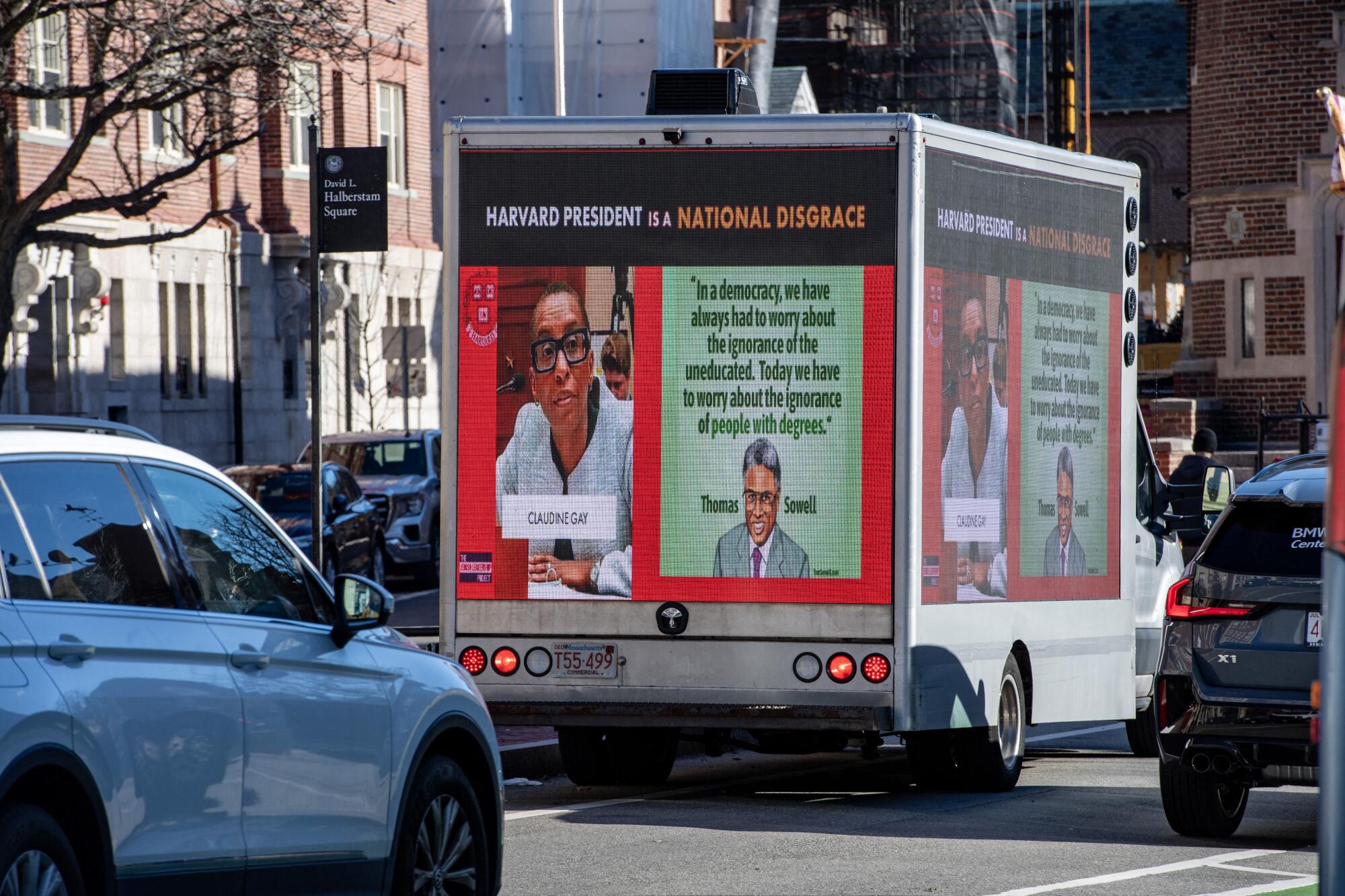
Gay said that she “should have had the presence of mind” to “return to my guiding truth, which is that calls for violence against our Jewish community — threats to our Jewish students — have no place at Harvard and will never go unchallenged.”
On Monday, Harvard’s governing board, after a lengthy closed-door meeting, announced support for her.
The U.S. Department of Education announced Tuesday it was opening investigations into allegations of discrimination based on shared ancestry at UCLA, UC San Diego, Stanford and three other universities.
The department did not specify what the allegations were, but it has opened investigations of 21 colleges and universities since the start of the war, part of what the department described in a statement as an effort to combat an “alarming nationwide rise in reports of antisemitism, anti-Muslim, anti-Arab and other forms of discrimination and harassment.”
Officials at many campuses have said they’re trying to balance the need to protect students against harassment while upholding principles of free speech. Critics, including, but not limited to, many conservative political figures, have charged the universities with a double-standard, saying they support free speech when Jews are the targets, but have often suppressed speech aimed at other minority groups.
: :
What’s behind the rise in antisemitism and how to respond to it are now much-debated topics in Jewish communities.
Some Jews talk of retreating into safe spaces and strengthening ties with one another.
Melanie Rosenthal, a real estate agent in West Hollywood, has embraced her Jewish identity while at the same time becoming cautious about public displays because of fears for her safety. On social media and accounts for Uber and Lyft, she has changed her last name so it no longer reads as a common Jewish name. Rosenthal has also removed mezuzahs from her property.
“There are Hanukkah events, but I’m a little scared to go out to them,” said Rosenthal, 41.
Robin Dale, a corporate recruiter in West Palm Beach, Fla., has instructed her son to be more discreet about his faith.
“My 28-year-old son has been wearing a Jewish star around his neck for years, and I told him to take it off,” said Dale, 58. “He’s 6-2, all muscles, and I told him, ‘I don’t care how big or strong you are, a gun can kill anybody.’”
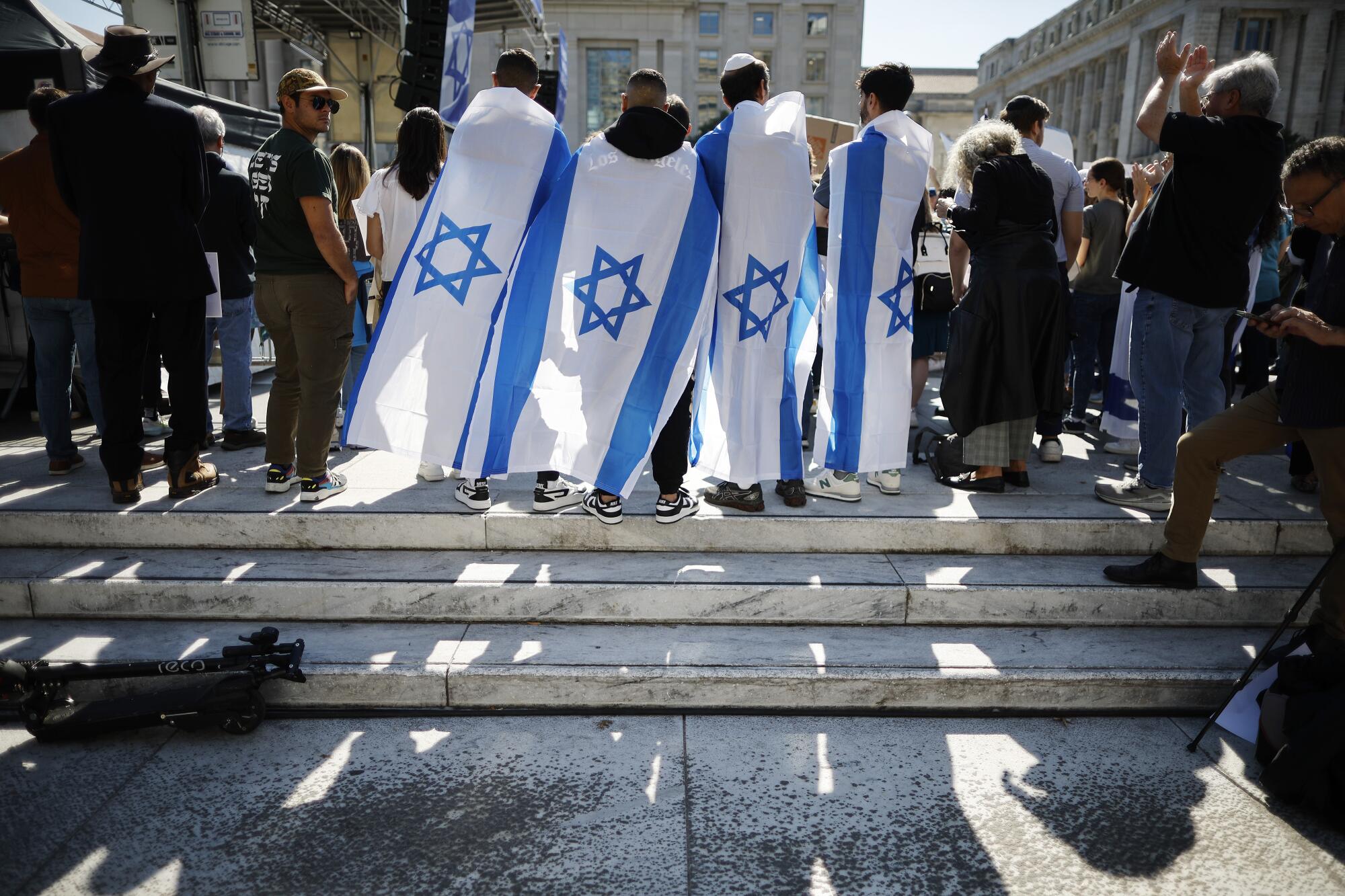
Others, including leaders of Jewish organizations, advocate efforts to reach out to other groups.
“If we’re going to succeed, if we’re going to exist, it [will be] because this generation continues to lean into each other and because our leadership at the highest levels says there’s no place for hate for anybody,” said Serena Oberstein, executive director of Jewish World Watch and one of the participants in The Times’ roundtable.
As for causes, researchers cite several changes in society that may each have contributed.
This moment in the Israel-Hamas saga can be glimpsed in the fate of two fathers, strangers who share misfortunes brought on by larger powers and are now left to find their way
For decades after World War II, memories of the Holocaust created a taboo on open expressions of antisemitism, wrote Michael Berenbaum, a Los Angeles-based historian of the Holocaust. That has faded as the Nazi era has receded into the past.
Others note a general coarsening of public life, a change that former President Trump has benefited from and promoted.
Trump “made it OK for people to say things they used to know they shouldn’t say,” said Mark Mellman, a prominent Democratic pollster and head of the super PAC Democratic Majority for Israel. For some people, that legitimization spills over from speech to action, he added.
There’s also the general decline of trust in institutions and dissatisfaction with the state of the country that has shaped political attitudes for the last two decades.
“When so many people think things have gone wrong, it’s time to bring out the scapegoats,” Mellman said.
“Jews have always been the scapegoat.”
More to Read
Sign up for Essential California
The most important California stories and recommendations in your inbox every morning.
You may occasionally receive promotional content from the Los Angeles Times.
